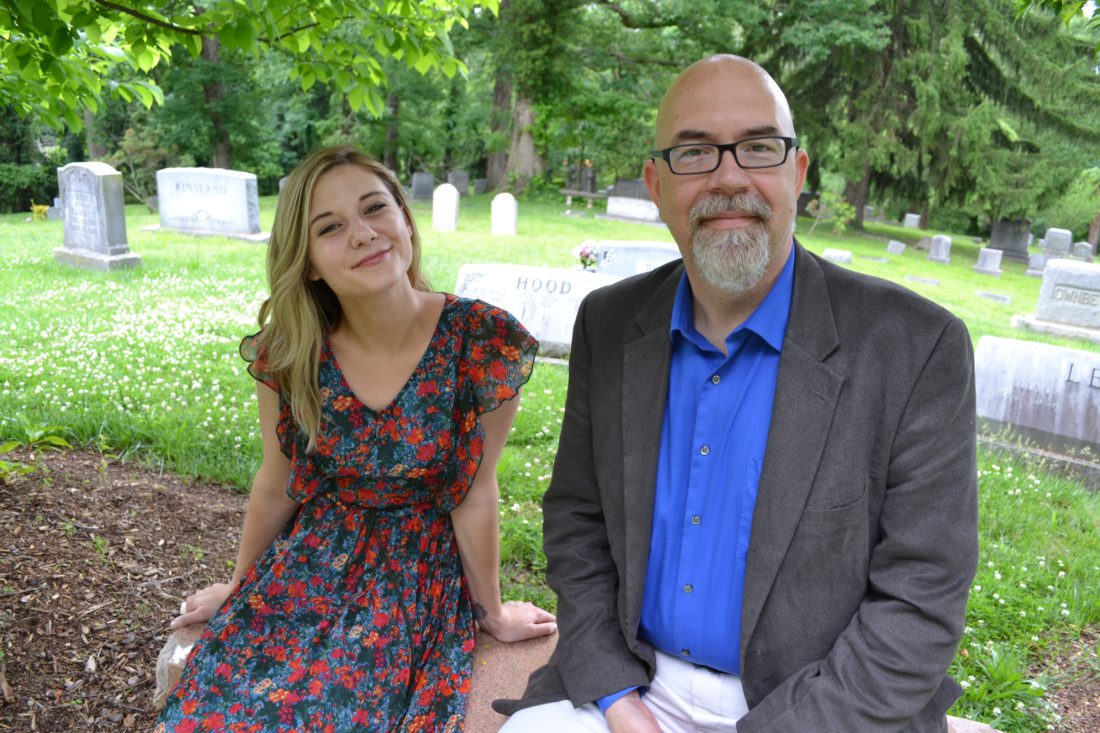We’re often unreliable narrators of our own stories. That’s definitely the case for Josephine Waters, an American code breaker living in London during The Blitz. Recruited from her graduate program at Cornell University, Josie feels rightfully displaced amid the rubble caused by German airstrikes. And yet there is something different about her — a difference that drives the third season of the single-voiced audio drama, “Palimpsest.”
“I saw a dead man this afternoon on my way home from the theater. I suppose that isn’t a big deal, not anymore,” narrates Josie, read by actor Hayley Heninger. “Except, as I stepped into the street to avoid the mess, the body sat up. That horribly misplaced head swung around toward me, casting off a cloud of dust. And he smiled. I wish it was the first time.”
Just moments into the season’s first episode, Josie divulges other encounters with the dead — a dashing soldier with a bullet hole just below his hairline and a small boy with skinned knees. She also reveals a certain mental instability that leaves listeners wondering if they should simply discredit her appeals altogether.
“I am fascinated by memories, and how they start and change,” says writer and producer Jamieson Ridenhour.
To that end, listeners can seldom trust the narrators of “Palimpsest.” Their lies aren’t malicious, per se. “They’re just speaking their own truths,” says Heninger.
Josie’s truths are told in the form of letters written to her child, a baby carried to term and later put up for adoption. Increasingly aware of her mortality, the narrator undresses her inner psyche with unabashed frankness. “I just feel so helpless,” she laments, her monologue punctuated by civil defense sirens. (Composer Ian Ridenhour, the producer’s son who scored the series, incorporated a chilling montage of sound effects.) “The bombs are always falling. It feels like the world is ending, and there’s nothing I can do.”
The effect is spine-tingling — a breathless soundscape for morning commutes and weekend errands. Jamieson Ridenhour, a horror writer who has produced psychological thrillers such as Grave Lullaby for The Magnetic Theatre, says this season departs from previous ones in its scope. While season one follows the character Anneliese through her sister’s death and season two divulges a queer fantasy, Josie’s story unpacks the history and horrors of a city at war.
“The bombing of London during World War II excavated much of the city,” says Ridenhour. “And much of what those bombs dug up should’ve stayed buried.”
Of course, there is a common thread connecting all narratives — a two-story home with a big oak tree and dilapidated swing. The house is a palimpsest, or something that has been overwritten imperfectly such that its underlying layers continue to shine through. Like poorly covered wallpaper, the home in “Palimpsest” withstands time and place, serving as a backdrop for all ghostly happenings. In effect, “the past erupts into the presents,” notes Ridenhour.
He and Heninger plunged into the world of audio in 2017, just three months after meeting through the production of Ridenhour’s original play, Terry Tempest: The Final Interview, and bonding over a mutual appreciation of “Buffy the Vampire Slayer.” Having never written episodically before, Ridenhour initially faltered in mastering the beat of a podcast. (Novels and plays generally don’t require as many hooks or endings.) But he soon found audio to be limitless, especially compared to the realism of live theater.
“There are lots of bombings, and I can’t really do that onstage,” Ridenhour laughs.
After two seasons, “Palimpsest” was put on hiatus while Heninger cared for her newborn, Florence. Exactly 375 days later, the writer-actor duo plunged back into “memory, identity and the things that haunt us.”
Their creative process begins with a basic plot, courtesy of Ridenhour, that is soon fleshed out over cocktails at Post 70. One challenge is framing the single-voiced composition. In season one, listeners were privy to notes Anneliese wrote to her therapist. In season two, the narration switched to a church confessional. Deciding on the current season’s format — letters to an abandoned child — required some character development. (And additional cocktails.)
A Ph.D. candidate, Josie is analytical and practical. She is perhaps more perturbed by the shapelessness of her life in London than the ashen corpses that inexplicably come to life in her presence. Needless to say, understanding the complexities of Josie is an ongoing process for Heninger.
“I’m now thinking through the filter of Josie,” she says. “I have to be in her headspace, otherwise I won’t believe what I’m saying.”
Speaking of reliability, as season three unfolds, listeners become more and more skeptical of Josie’s ethos. A single question rides the coattails of each 20-minute episode: Should I believe what she’s saying? And that, says Ridenhour, is the beauty of an unreliable narrator.
“Palimpsest” releases new episodes biweekly on Tuesdays. Visit thepalimpsestpodcast.com to listen. Episodes are also available on Apple Podcasts, Stitcher, TuneIn, GooglePlay, Podchaser and Spotify.




Before you comment
The comments section is here to provide a platform for civil dialogue on the issues we face together as a local community. Xpress is committed to offering this platform for all voices, but when the tone of the discussion gets nasty or strays off topic, we believe many people choose not to participate. Xpress editors are determined to moderate comments to ensure a constructive interchange is maintained. All comments judged not to be in keeping with the spirit of civil discourse will be removed and repeat violators will be banned. See here for our terms of service. Thank you for being part of this effort to promote respectful discussion.